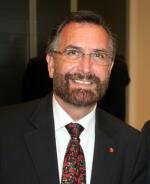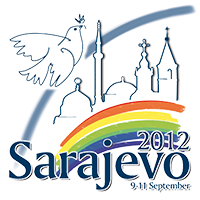
Rabbi, International Director of Interreligious Affairs, AJC
|
As important as the title of this panel is for humanity, it has particular resonance for me as a religious Jew. For Judaism can function without a synagogue (when there is no alternative, prayers may be recited individually without a quorum); it can even function without a study center/school (if there is education in the home); but it cannot function without family. Indeed, the home is the real religious center of Jewish life and celebrations. However the Jewish understanding of the significance of the family is of universal relevance and importance.
The central theme of Jewish religious life is that of sanctity. “For you shall be for me a kingdom of priests and a holy nation (Exodus 19 v. 6), God declares to the children of Israel as they are about to enter as a people into the Covenant at Sinai. “You shall be holy, because I the Lord your God am holy (Leviticus 19 v. 1), is the commandment that introduces the whole gamut of ethical and ritual observances of Jewish life. And the Midrashic work the Sifri explains the verses (Leviticus 22 v. 31-33) that read “and you shall keep my commandments and do them... and I shall be sanctified amidst the children of Israel, I am the Lord who sanctifies you, who brought you out of the land of Egypt to be your God...” to mean that God says ‘for that reason I brought you out of Egypt, that you may be holy and sanctify my Name in the world’.
In religious terms therefore, sanctification is the actual reason for the very existence of the Jewish People.
It is thus not without significance that the Hebrew word for Jewish marriage (Kiddushin) means “holiness or sanctification”. Not only is the relationship of marital commitment itself seen as holy , but the family as the central institution and focus of Jewish life, is the key to the realization of the people’s raison d’etre, to be “a holy nation.”
The central significance of family in Jewish tradition is highlighted by the Bible in its narrative dealing with the trailblazer of ethical monotheism, the first patriarch, Abraham. Despite his pioneering achievements in bringing the knowledge of the one God, His Will and Ways, to the knowledge of so many others (as our sages interpret the phrase in Genesis 12 v. 5, “and the souls that they had made in Haran”), Abraham nevertheless yearned to be blessed with his own progeny; to have the full family network in which the profundity of spiritual and ethical commitment may be most fully transmitted. As stated in Genesis 18 v. 19, “For I have known him that he will command his children and his household after him that they will keep the way of the Lord to do righteousness and justice...”.
Significantly then, it is the extension of the family of Abraham, Isaac and Jacob - known as the children of Israel - that becomes the nation. Indeed the nation is the sum total of its families and thus the nation lives up to its metier, when its families live up to their sacred task as sanctuaries of Jewish life. Regarding the words of the gentile prophet Balaam, “How goodly are your tents O Jacob, your dwelling places (literally - sanctuaries) O Israel” (Numbers 24 v. 5), say the rabbis, ‘When are the tents of Jacob goodly ? when they are ‘the sanctuaries of Israel!’
And they are sanctuaries when they embody the letter and spirit of the commandments. Significantly then, the commandment to honor one’s mother and father is at the center of the Decalogue itself .
Indeed the honor and reverence that the Bible requires children to show parents is seen within Jewish Tradition as bound up with that which we are required to express towards God Himself. The sages point out that the Torah uses the same injunction “you shall revere” for both parents and God; and similarly prohibits cursing both God and parents. This, they say, is because “all three are partners in creating the individual.”
Rabbi Shimon bar Yochai says “The Honor due to Father and Mother, is so great (in importance) that God has made it (even) more important than His own honor. For it is written (in the Decalogue) ‘Honor your Father and your Mother’( without qualification), but it says (in Proverbs 3 v. 9), ‘Honor God with your substance’ (making the degree of honor) conditional on one’s means” (Jerusalem Talmud Kiddushin, 1, 7).
Furthermore as the Fifth declaration of the Decalogue, this commandment connects those concerning our relationship with God, with the commandments concerning relations between one person and another, indicating that the right relationship between Faith and society depends substantially on the relationship between children and parents .
Moreover, this is the command for which specific reward is promised - namely the prolongation of days on the land.
Jewish tradition has expounded on the meaning of this, most importantly, in terms of the reward in the afterlife - the world to come. However, certain commentators have also noted the fact that the phrase promising longevity in the Torah is mostly in the plural, suggesting that it may refer to society at large. According to this understanding, the promise is emphasizing the crucial importance of a loving respectful relationship of children towards parents, for the ongoing survival and health of society as a whole.
Indeed , in light of my earlier comments about the religious value of progeny as the crucible for the transmission of religio-ethical values, we may say that without the family, it is impossible to nurture a truly moral society.
The blessings of modern day society that have allowed modern man and woman to throw off different types of shackles of bondage from the past and to exercise their God given value as individuals, has proven to be a double edged sword. Because all too often this individualism throws out the baby with the dirty bathwater and rejects that which is good and essential in tradition. Arguably nowhere is this more evident than with the family. For where parents exercise their loving responsibility for children and where children live with respect and love for parents, there you have solid foundations for the health and prosperity of society. However where these are lacking and the family has broken down, the consequences for society at large are pernicious and ultimately disastrous.
Indeed as mentioned, it is not only parental and filial commitment that gives the family its crucial significance for the welfare of society, but also its role as the most fundamental educational unit for the nurturing and transmitting of religio-ethical values.
The educational responsibilities upon the parents therefore are substantial.
Already in the Torah (the Pentateuch) there is a command to bring the children to the public reading of the Torah by the King (Deuteronomy 31 v. 10-12.)
However the educational responsibility is most categorically expressed in Deuteronomy, 6 v.4-9, - the passage that was identified by the sages, as the quintessential declaration of Jewish Faith and responsibility - which we recite in our prayers every morning and evening:
“Hear O Israel the Lord your God, the Lord is One. And you shall love the Lord Your God with all your heart with all your soul and with all your might. And these words which I command you this day shall be upon your heart.
And you shall teach them diligently to your children and speak about them when you sit down in your home and when you walk on the way...”.
The idea is further embellished powerfully in the Midrashic legend (Tanhuma, Vayigash) that declares that when God was about to give the Torah to Israel, he asked for guarantors. The people of Israel offered the Patriarchs and then offered the prophets, but God did not accept any of them as adequate guarantors. But when they offered their children as guarantors, God accepted them as such and gave the people the Torah.
In emphasizing that our values and way of life are guaranteed by our children - i.e., that our continuity depends above all on the future even more than the past - the Midrash also declares that our own faith and fidelity to it are measured by the extent to which we strive to ensure that our children are indeed “guarantors” of our posterity.
This truth is a universal one and perhaps never more critical than in our contemporary world. The health, strength and continuity of human society can only be guaranteed through the God given unit that bring a man and woman together in sanctity to nurture progeny and instill spiritual and moral values accordingly to God's law. |

